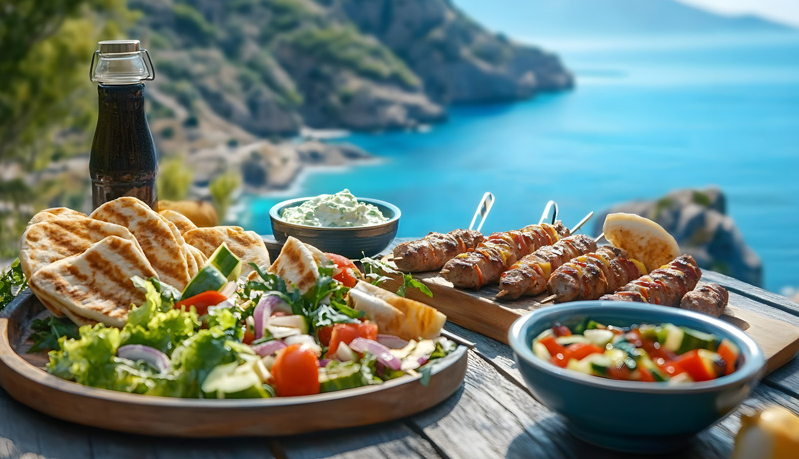
My wife, Killy and I were on holiday in Greece—sunshine, sea and the sacred daily ritual of deciding what to eat. One evening we arrived at the hotel restaurant, stomachs empty (we’d skipped lunch!) and with expectation and anticipation. A smiling waiter handed us the à la carte menu. Oh yes!
Lamb slow-roasted in honey and thyme.
Grilled prawns nestled on saffron-infused risotto.
Baklava bathed in rosewater syrup.
We were salivating!
Then, tragedy struck.
Half-board? I thought. More like half-welcome.
Before we could even get to the second syllable of "moussaka", the waiter snatched the menus away. No apology. No explanation. Just a culinary confiscation.
The waiter then said briskly. "Wrong menu. You are half-board."
Half-board? I thought. More like half-welcome.
Instead of the glories of Greek gastronomy, we were handed the half-board menu, a single sheet of paper.
Three courses. No options.
Starter: "Soup." It was 85 degrees fahrenheit and I come from England. I didn’t want soup. I wanted shade and an iced coffee.
Main: "Fish." Not even a choice of fish, just . . . fish. Singular.
Dessert: "Apple pie." That’s it.
And it was at that moment we understood what "half-board" really meant: they fill your plate, not your heart.
For the next two hours we sat like guests at the wrong wedding reception—close enough to see the party, but far enough to know you’re not invited.
We sat chewing our mystery menu with growing emotional trauma.
All around us, other diners ordered grilled sea bass, flaming lamb, and feta salads. Waiters danced by with platters and smiles, while we sat chewing our mystery menu with growing emotional trauma.
Every few minutes a waiter would stroll past with something aromatic and theatrical—smoke, sizzle, drizzle—and I found myself narrating like the English naturalist David Attenborough:
"Here we see the majestic lamb shank, descending gracefully onto a bed of couscous, bypassing Table 7, where the half-boarders sit, silent, and questioning their life choices."
And then it happened. I experienced something unexpected. FOMO: "Fear Of Missing Out". Not the usual social kind. No, this was a full-fat, deep-in-the-gut, existential cuisine crisis. And the worst part? I’m not usually like this.
Killy, bless her, was gracious. She said, "It’s okay, it’s just food."
But I wasn’t okay. I was half-board and fully-bitter. Sitting in the birthplace of democracy, yet unable to vote for dessert.
What is FOMO?
Somewhere, is living their best life... and it’s definitely not you.
FOMO is a modern phrase, coined in the early 2000s and spread through social media. It’s that uneasy feeling that someone, somewhere, is living their best life... and it’s definitely not you.
While you’re reheating last night’s pasta and scrolling through social media, someone else is scuba-diving in the Maldives, riding horseback through Tuscany, or gliding across the Mediterranean on a yacht, obviously, with a drone capturing it all!
FOMO is the belief that life is hugging everyone else while you’re stuck holding the coats.
It’s what happens when we compare the curated, filtered, glammed-up, highlight reel of someone else’s day to our own slightly overcooked Friday.
Envy: the real culprit behind FOMO
Let’s be honest. Underneath the hashtags and the humble brags is an ancient emotion: envy. Now, envy and jealousy are cousins, but they’re not identical twins.
- Jealousy is fear of losing what you have.
- Envy is resentment that someone else has what you want.
FOMO is envy in digital disguise. It whispers, ‘Why them and not me?’
FOMO is envy in digital disguise.
The Bible doesn’t sugar-coat envy: "A heart at peace gives life to the body, but envy rots the bones" (Proverbs 14:30 NIV).
And social media? It can be a 24-hour bone buffet.
But here’s the truth: we’re rarely envious of someone’s reality. We’re envious of their presentation. We see the edit, not the effort. The post, not the pressure. The snapshot, not the full story.
Practical symptoms of FOMO
- You stop tasting your own meal because you’re watching someone else’s.
- You measure your worth by other people’s moments.
- Your sense of gratitude disappears the moment you open Instagram.
The antidote to envy: gratitude and contentment
The gospel offers a completely different lens:
- Gratitude says: "What I have is a gift."
- Contentment says: "And it’s enough."
Scripture invites us to breathe deep and let go of comparison:
- ‘Godliness with contentment is great gain.’ (1 Timothy 6:6 NIV)
- ‘Be thankful in all circumstances.’ (1 Thessalonians 5:18 NLT)
- ‘I have learned to be content whatever the circumstances.’ (Philippians 4:11 NIV)
When we practice gratitude, envy loses oxygen. When we lean into contentment, FOMO withers.
Half-board wisdom: what did I learn?
So, back to our half-board in Greece. What did I learn?
I learned that envy edits God out of the moment.
I learned that envy edits God out of the moment.I was so distracted by what I didn’t get that I almost missed the gift I did get:
- A table for two with Killy.
- A funny memory we’ll still be telling in ten years.
- And a gentle lesson from heaven: stop staring at other people’s plates and look at who’s sitting across the table.
Contentment doesn’t mean pretending the à la carte didn’t look amazing. It means trusting that God’s goodness isn’t a limited menu. He knows what we need. He knows what nourishes. And sometimes... he lets us taste humility and humor before dessert!
So I conclude with a sincere prayer:
Lord of every table,
You know how easily my heart drifts into envy.
I scroll past someone else’s joy and forget my own blessings.
I grumble over soup when I should be giving thanks for daily bread.
Forgive me for comparing, complaining and craving what wasn’t mine.
Rescue me from resenting someone else’s celebration.
Teach me to bless what others enjoy and rejoice in what you’ve placed before me.
May I be quicker to thank than to scroll.
Quicker to celebrate than compare.
And quicker to taste joy in the ordinary.
Remind me that the best things in life aren’t posted.
They’re lived.
And they’re found in you.
Amen.
Originally published by Philo Trust. Republished with permission.
J.John is an evangelist, minister, speaker, broadcaster and writer. He has been in ministry for four decades. He has spoken in towns, cities and universities in 69 countries, establishing Philo Trust in 1982 to organize his various evangelistic ministry offerings. J.John’s weekly podcast, The J.John Podcast, features a range of interviews with Christians from all walks of life and talks by J.John. Click here to listen. J.John’s books are available to order via jjohn.com or through other online or physical bookshops.
Philo Trust was established by J.John in 1982 to organize evangelistic events and projects, equip Christians to naturally share their faith, mentor evangelists, and produce books and resources to help people in their journey of faith.






